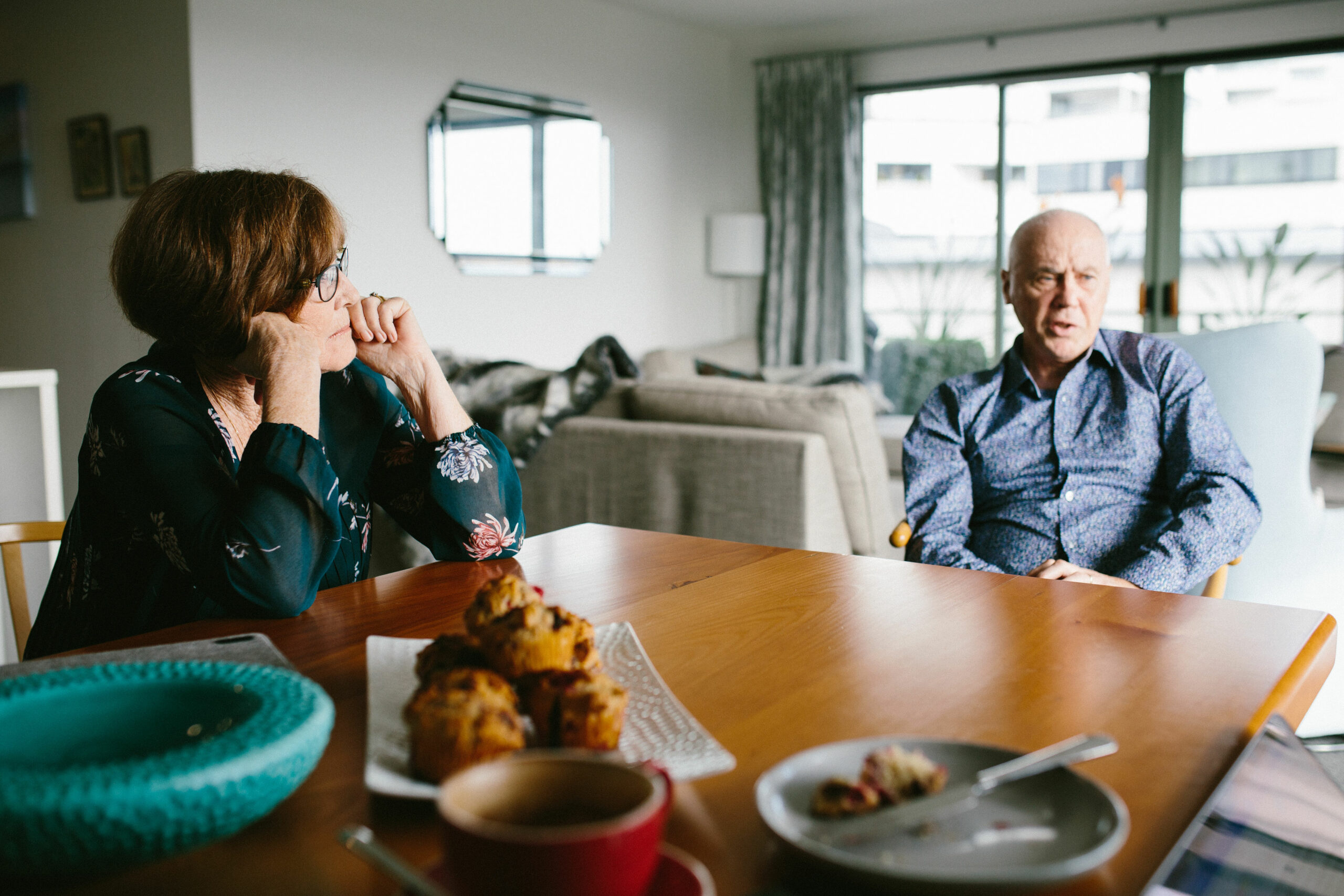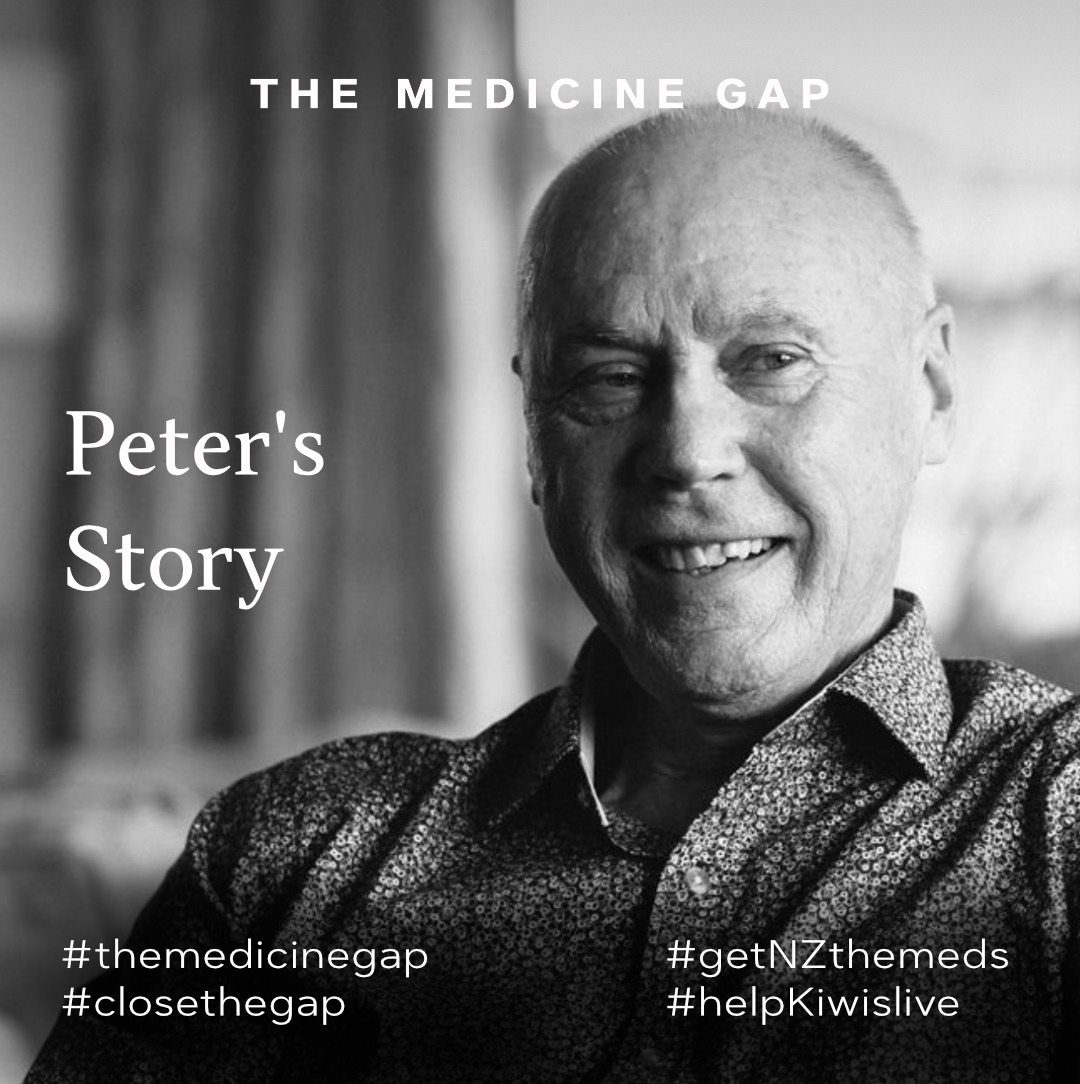
Peter and Carol have loved each other for over half a century.
On their first date, in 1969, they saw The Graduate at the Orewa movie theatre. Dustin Hoffman, a little-known 21-year-old actor, was starring in his breakthrough role, famously being seduced by an older Mrs Robinson.
Peter, an 18-year-old journalist, had recently left his home in Wanganui to take up a community newspaper job in Orewa. He met Carol, a Whangaparaoa girl, soon after he arrived.
“My boss’s wife saw us out together and the next day he asked me why I was at the movies with a schoolboy,” Carol says.
Peter smiles. “Yes, I did look quite young.”
“Well, we were young,” Carol says.
Last year, on the 2nd of December, Peter and Carol celebrated their Golden Wedding Anniversary. Peter speaks in a gentle, measured voice, but he is triumphant when he says, “we made it”.
There was never any doubt about the strength of their marriage, nor the resilience of their love. No. That was never in question. It was Peter’s health that threatened to rob them of an opportunity to celebrate their 50-year milestone. Cancer cares little for sentiment or celebration.

Three years earlier, in December 2017, Peter had developed a scratchy throat. He thought he was getting a cold, but it went on for a couple of weeks. He was heading off to Australia, so the doctor prescribed a course of antibiotics to ward off an infection.
“But a month or so later, I still had this scratchy throat.”
He booked in to see a specialist, but the first available appointment was six weeks away. Then, one night when Peter was watching the news, he began to cough.
“I looked down and there was a red splodge of blood on my hand, so Carol got me in the car and off we went to A and E.”
Peter spent the night in hospital where, by chance, an Ear, Nose and Throat Specialist was on shift.
“She came to see me at 2am and told me I had a tumor on the base of my tongue. All I could think was ‘how on earth am I going to tell Carol?’. And so I lay awake until 7am and then I rang her, and I told her I had cancer. Head and neck cancer.”
Peter’s voice breaks at this point. He apologises. I apologise. And Carol, with tears in her eyes, tells us both it’s okay.
“Sometimes we need to cry. We knew we were going to re-live all of this today. It’s okay. Tears are okay.”

For many years, Peter was a journalist. He was in the Press Gallery in the early 1980s, covering the Springbok Riots and the tumultuous final years of Robert Muldoon’s Government.
Later, he was posted to London “in the heyday of newspapers” and took Carol and their three children to live in Wimbledon. It was a heady time to be in London and working in Fleet Street, the beating heart of the British press juggernaut.
On his return to New Zealand, Peter would ultimately become the Chief Operating Officer and Editor-In-Chief of Fairfax New Zealand, before stepping aside in 2007. In hindsight, that decision has given Peter and Carol a decade together away from the 24/7 demands of corporate life.
Not surprisingly, Peter has remained heavily engaged with the news.
“Once a news hound, always a news hound,” Carol smiles.

That said, Peter’s not used to being the subject of a story. He’s more comfortable asking the questions, not answering them. In fact, when The Medicine Gap first approached Peter, he was a little on the back foot.
“Are you sure? I don’t think anyone wants to hear from me, do they? I’m a white, middle-class, male Boomer,” he said. He wasn’t sure he had anything to add.
But this speaks to the very core of New Zealand’s unfunded medicines crisis. Our lack of access to funded, modern medicines impacts every New Zealander irrespective of age, ethnicity, or social demographic.
If you fall ill in New Zealand, there is a high probability you will have to pay to access a modern medicine or immunotherapy. If you can’t afford it, it’s the end of the road. It is that brutal.

Peter had metastatic, squamous cell, head and neck cancer. The first step in his treatment was surgery. He needed two procedures in quick succession. The first was urgent. The scan showed lymph nodes “lighting up” on one side of Peter’s neck, and the decision was made to remove nodes from both sides of his neck. It would be a major operation.
“In the initial consultation, the surgeon told me that he might have to take my jugular vein and once the nodes were removed, my neck would be stapled from ear to ear. That was the last time I drank. I went home and had six bottles of beer.”
Peter had 59 lymph nodes and his jugular vein removed. He then had to focus on his recovery and readying himself for the second procedure; a robotic surgery at the base of his tongue to reach the tumour.
“I asked the nurse if I could see him, the robot. I wanted to see what would be operating on me.”
Peter still smiles at the nurse’s response.

“She told me the robot wasn’t a him, it was a her. She said they’d had a ‘him’ but he was useless, so they’d got rid of him.”
The final step in Peter’s treatment was a seven-week course of Cetuximab, a drug that Pharmac had just conditionally funded for the treatment of head and neck cancer, and 30 sessions of radiation.
In April 2018, four months after his diagnosis, Peter got the good news.
“It was gone. I felt incredible. This was an incurable cancer and I’d beaten it.”
Peter was scheduled for a follow up a year later and got on with living his life. Then, in April 2019, he had a PET-Scan. The cancer was back and had metastasised in his lungs and thorax. Peter asked the surgeon how long he had. He was told that someone in his condition usually would not survive beyond 12 months, and he recommended palliative chemotherapy.
Carol breaks the tension with a little bit of humour. “Then it was my turn to get drunk,”
Peter and Carol look at each other. They nod. They remember. It was a long, challenging night as they both tried to come to terms with such a devastating prognosis.
“You are there, together, and there is nothing you can do. You are looking into the abyss,” Peter says.
Over the next 24 hours, Peter says he learnt for the first time what it means to a human being to have ‘hope’. For 24 hours, he had none. The surgeon had given him the dire news. The curtain was coming down. Death was approaching. All hope was gone.
For Carol, it was the same sense of utter hopelessness.
“When one of you gets sick, you both get sick,” she says.

The next morning, Peter phoned the secretary for his radiology oncologist, to cancel a scheduled check-up. There was nothing more they could do, so he urged the clinic to free up the appointment for someone else. A few minutes later, the secretary called back.
Peter’s radiology oncologist, Dr Guiseppe Sasso, was apparently insistent, the secretary said. Peter and Carol should come and see him at 6 o’clock that night.
“And that phone call, ultimately, is why I’m here today,” Peter says.
Dr Sasso told Peter about Keytruda, an immunotherapy treatment that targets cancer cells. It’s considered one of the greatest breakthroughs in cancer treatments since chemotherapy and is publicly funded all over the world. In New Zealand, it’s funded for melanoma – but no other cancer.
If Peter wanted Keytruda, he would have to pay for it.
“And that gave us hope. Pepe, my oncologist, gave us hope again. And that is just so important. Carol and I sat there and suddenly from night, there was day.”
Peter says he considers himself extremely fortunate.
“We are in a position where we can access the money. Not everyone can find $69,000 to pay for Keytruda. And because we had the money, that’s why I am here today. But what about New Zealanders who can’t access that sort of money? What happens to them?”
Keytruda costs $60,000, but the Government applies GST of $9,000 on top.
Not only was Peter self-funding his treatment, he was paying GST on it too. His health insurer paid to administer the three-weekly infusions of Keytruda, but if he didn’t have health insurance, the cost would have increased by several thousand more.

Incredulously, not only do we not fund a myriad of modern medicines in New Zealand, but our health system won’t provide a nurse to administer the drug if you are self-funding. That’s yet another cost to you.
“That’s why I spoke at the Parliamentary Health Select Committee this year. Carol and I wanted to tell our story in a public arena in the hope that it will give New Zealanders an opportunity to access this drug. It should be available on our public health system.”
More than two years after his diagnosis, Peter is still here. He is having chemotherapy because the cancer has reappeared in his lung and chest and he has pneumonitis; a rare side effect triggered by immunotherapy. Peter remains an optimist, but a realist.
“Keytruda has given me time. It’s given me time with my family, my children, and my grandchildren. It’s why I’m here.”
“You have to look for the light. I think about the grandkids, I think about my three wonderful children and their families, I think about the people who ring just to say hello. It’s been incredible. We just have so much support from everyone including our oncology, radiology and surgical teams.”
The tears come again, for both of them this time.
“It’s Carol. She has carried the burden. Carol is my real hero,” Peter says.
There’s no apology for the tears this time. There’s none needed. Not when you’ve loved each other for more than half a century.

Show your support.
Share Peter’s story.
New Zealand needs access now to modern medicines to treat Head and Neck Cancer.


Other Voices
Let’s close the Gap
Get Involved1.
REFORM
PHARMAC
Achieve a measurable, political commitment to reform Pharmac and create a fit-for-purpose drug-buying agency that supports and enables greatly improved access to modern medicines – and ensure a direct line of political accountability.
2.
OVERHAUL THE FUNDING
METHODOLOGY
Introduce a globally accepted modern, cost-benefit analysis for medicines and medical devices which looks at the ‘value’ of a medicine, and considers the financial, economic, and social impact of untreated disease on our society.
3.
COMMIT TO AN OUTCOMES-BASED MEDICAL STRATEGY
Develop a Medicines Strategy to guide the decision-making process, create measurable targets to reduce Pharmac’s waiting list, and detail how the agency will respond to rapid developments in modern medicine to improve health outcomes for New Zealanders.